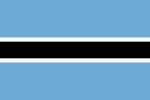| Part of a series on the |
| Culture of Botswana |
|---|
 |
| People |
| Languages |
| Cuisine |
| Religion |
| Art |
| Literature |
| Music |
| Sport |
Most literature in Botswana is written in English, though many works are published in Setswana and a small minority are published in other native languages. Economic challenges limit a wider production of literature in Botswana, as books are often unavailable to citizens and authors generally make little money, especially with non-English writings.
Fables have existed through oral literature since ancient times, and praise poems became a common way to recount a person's life and accomplishments. The arrival of European missionaries in the 19th century brought changes to literature in present-day Botswana. Robert Moffat introduced a standardised orthography for Setswana in 1826 when he translated several Christian texts and a dictionary into the language. Explorers and colonists wrote many travel books about the region throughout the century. Mass media developed toward the end of the 19th century as Christian newsletters were distributed. The establishment of Pius XII College in 1945 allowed the British colonial administration to introduce English-language literature to the nation, beginning a lasting debate over the roles of English literature versus those of native languages in Botswana.
Many newspapers began publication as Botswana moved toward independence in the 1960s. Upon independence, Botswana became a member of the Berne Convention by adopting the British Copyright Act 1956. Bessie Head became the first internationally recognised Motswana writer in the mid-20th century, followed by Unity Dow at the end of the century. Both of these authors used their works to comment on women's rights and the role of women in Africa. Other authors, such as Andrew Sesinyi, Galesiti Baruti, and Mositi Torontle, explored the clash between traditional values and modernism after Botswana achieved independence. Several foreign novels have been set in Botswana, traditionally portraying it as an empty wilderness in the Kalahari Desert or as a means for white people to find meaning in a new setting. The No. 1 Ladies' Detective Agency by Alexander McCall Smith presents a more nuanced portrayal of the nation and became a central aspect of Botswana's image in the Western world.
